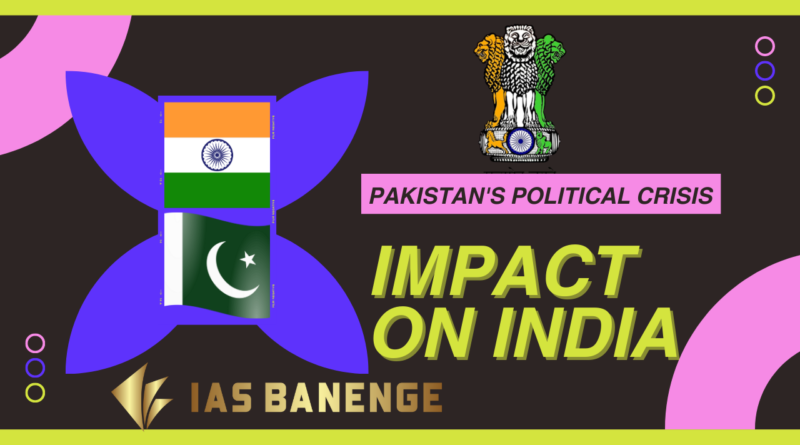Pakistan’s Political Crisis’s Impact on India |Ias Banenge
- In Pakistan , since being expelled from power, Imran Khan and his PTI party have been opposing the administration of Prime Minister Shehbaz Sharif. Imran Khan’s detention sparked rallies across Pakistan, resulting in a political crisis.
- Economic crises and natural catastrophes have added to Sharif’s government’s unpopularity.
- Conflicts between Khan and Pakistan’s military have further complicated the political picture.
Relevance:
GS Paper-2: India and its Neighbourhood- relations
Mains Question
Analyse any potential effects that Pakistan’s political crisis may have on India. Consider the potential and difficulties it poses for India in terms of bilateral relations and regional security. (250 Words)
READ MORE – How Regenerative Agriculture Can Prevent Soil Decay|Ias Banenge
Reasons behind Imran Khan’s Arrest
- Imran Khan was detained due to allegations of corruption stemming from a money laundering case involving a well-known real estate magnate; the arrest provoked violent protests that left many people dead and others detained.
- Protesters attacked military facilities, which made the situation worse.
Current events in Pakistan:
The army has been sent in to stabilise the domestic situation, but a long-term solution to address complaints is questionable. Imran Khan and key party leaders are being questioned by the National Accountability Bureau.
Implications for Pakistani Politics:
- According to some observers, this crisis may mark a turning point in Pakistani politics.
- The military’s public dispute with a well-liked national politician has received criticism.
- Prime Minister Sharif’s approval ratings would suffer as a result of his absence during the crisis.
Challenges for India include:
- An increase in cross-border tensions, particularly along the Line of Control (LoC) in Kashmir as a result of the political crisis.
- Pakistan-based extremist groups could take advantage of the country’s internal unrest to target India, creating security issues.
- Compromised Regional Security: o Pakistan’s instability might erode regional security dynamics and exacerbate already-existing disputes, like those involving Kashmir.
- The situation would divert Pakistan’s focus away from counterterrorism initiatives, which might allow terrorist organisations to operate more freely.
- Impacts on Peace Process:
- o Any ongoing peace initiatives or conversations between India and Pakistan could be derailed by the political crisis, making it more difficult to address thorny problems.
- Nationalistic emotions and pressure from the Indian public may limit the government’s ability to engage with Pakistan in a positive way.
Opportunities for India include the following:
- Diplomatic Leverage: Pakistan’s internal unrest may give India a chance to improve its diplomatic position on issues relating to regional security.
- India can take advantage of the crisis in Pakistan to draw attention to worries about transnational terrorism and encourage international pressure on Pakistan to address these issues.
- Collaboration in the fight against terrorism: o Given the necessity of addressing common security issues, international partners may be more eager to work with India in this regard.
- Improved intelligence collaboration and sharing may help reduce cross-border infiltration and stop terrorist activities.
- Regional Power Projection: o In contrast to Pakistan’s domestic unrest, India can show that it can sustain peace and effectively address regional concerns.
- India’s standing as a responsible regional power might be improved by fortifying regional alliances and partnerships, notably with nations in South Asia and the Middle East.
Possible approaches India may take to deal with Pakistan’s political crisis include:
- Maintain Diplomatic Channels: India should keep up diplomatic relations with Pakistan, even when they are strained politically, to keep lines of communication open and avoid misinterpretations.
- Ongoing diplomatic efforts can aid in defusing tensions and advancing stability in the area.
- enhance Regional ties: To mitigate any potential negative effects of Pakistan’s political instability, India should enhance its ties with its neighbours and other regional powers.
- Cooperating with nations like the US, Japan, and ASEAN countries can give the area support and influence.
- Put an emphasis on economic development: o To strengthen India’s position as a regional economic powerhouse, place an emphasis on the country’s own economic growth and development.
- India’s influence and resiliency in the face of regional instability will increase with the strengthening of local economic sectors and the attraction of international investments.
- Encourage Soft Power and Cultural Exchange: o Use soft power instruments to promote goodwill and understanding between the peoples of India and Pakistan, such as cultural exchange programmes, interpersonal contacts, and educational efforts.
- Fostering cultural relationships can help close gaps and foster an atmosphere that is conducive to communication and collaboration.
- Alertness to Security Issues: o To reduce potential security risks brought on by Pakistan’s political upheaval, strengthen border security measures.
- Keep a strong intelligence network in place to track and address any threats to national security or cross-border operations.
- Place a Focus on Regional connection: To improve regional integration, give regional connection initiatives—such as infrastructure development, transportation networks, and energy partnerships—priority.
- Projects like the International North-South Transport Corridor, the South Asian Association for Regional Cooperation (SAARC), and the Chabahar Port project can promote economic cooperation and ease tensions in the region.
- Interaction with the International Community: o Interact with the international community, including multilateral venues like the United Nations, to raise issues and solicit backing for regional stability.
- Work together with nations that share similar viewpoints to solve common problems and forward a planned strategy for handling Pakistan’s political turmoil.
- Track-II Diplomacy and Civil Society Engagement: o Promote intercultural discussions, people-to-people contacts, and track-II diplomacy efforts to increase mutual understanding and trust between Pakistan and India.
- Work with non-governmental organisations, academic institutions, and civil society groups to foster communication and advance peaceful solutions.
Conclusion
The political crisis in Pakistan presents both challenges and opportunities for India in terms of regional security and bilateral relations. While the crisis may increase cross-border tensions and compromise regional stability, it also gives India diplomatic leverage, opportunities for counterterrorism cooperation, and a chance to engage in constructive dialogue.




